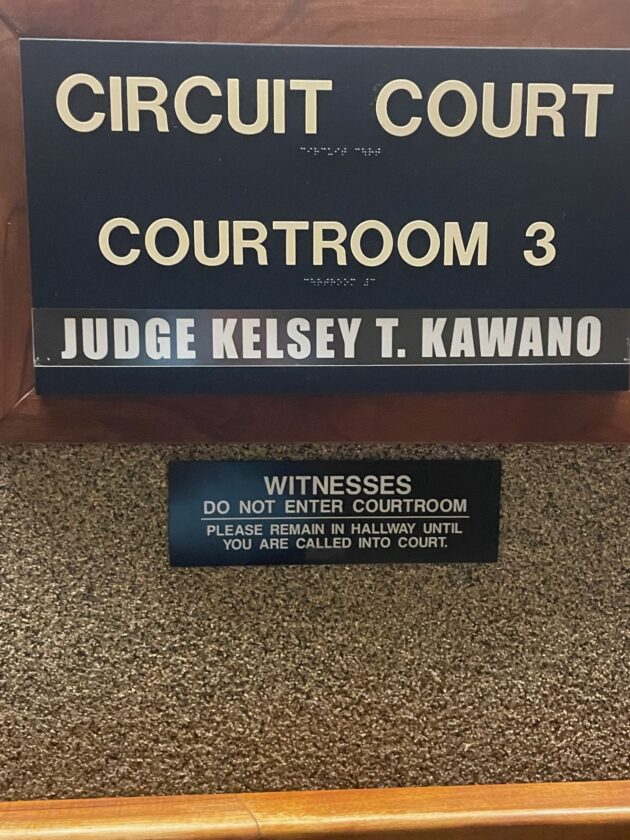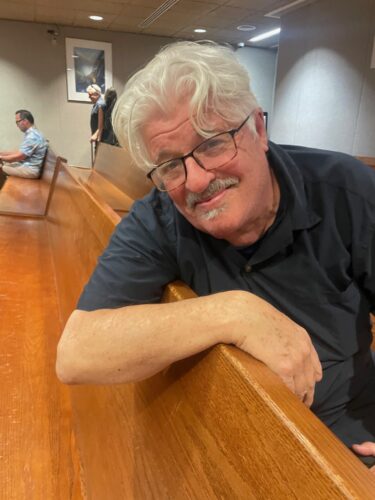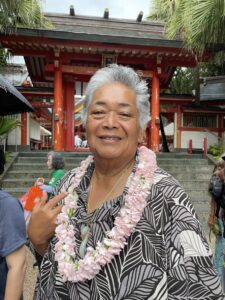Akakū has day in court; decision could affect future of public access TV on Maui

The courtroom was the scene of a hearing Wednesday where Akakū public media stated its case before Judge Kelsey Kawano. Also on hand were lawyers for Spectrum Cable, the state Department of Commerce and Consumer Affairs and about 30 spectators. The Maui News/Andy Gross
Facing impending revenue cuts that could threaten public access TV in Maui County, Akakū presented its case Wednesday before Judge Kelsey T. Kawano.
Leadership at the public access media company decried what it deems an unjust denial of a seat at the table with the state Department of Commerce and Consumer Affairs, and cable giant Spectrum.
After hearing arguments at the Second Circuit Court in Wailuku from Akakū’s lawyer Lance Collins and Hawaii Deputy Attorney General Shari Wong and Claire Black, counsel for Spectrum, the judge continued the case till 9.m. Aug. 20.
Collins said the judge can reverse a decision by the department and allow Akakū to participate in Spectrum’s franchise renewal process or he could affirm the department’s decision and deny Akakū a chance to participate in the franchise renewal process.
Jay April, president and CEO of Akakū, said that in the process of renewing Spectrum’s franchise agreement for Maui, Nadine Ando, the director of the state Department of Commerce and Consumer Affairs, denied Akakū a chance to intervene in the proceedings.
As Maui County’s public access television network, Akakū provides news coverage of local government and a variety of other community programming and services.
According to Akakū leadership, the nonprofit media agency is battling to prevent the loss of significant funding from cable company franchise fees, which state officials say is due to a decision by the Federal Communications Commission during President Donald Trump’s first administration.

Jay April, CEO and president of Akakū, attends Wednesday’s hearing. At stake might be funding cuts that could impact the nonprofit. April said Akakū wants a seat at the table when franchise fees are renegotiated. The Maui News/Andy Gross
Collins argued that among other things, Akakū has First Amendment rights and standing that merited the nonprofit due process and inclusion. He said Akakū has a strong legal entitlement and a “long standing function” in the community, and must be included in the process.
Collins said the department did not even read the petition before denying it, and he called the department’s actions “arbitrary and capricious.”
Wong argued that this was the first time a third party such as Akakū has tried to get a contested hearing regarding a franchise renewal agreement. She said such decisions were between the state and Spectrum.
“There is no appellate precedent for this. It makes no sense,” she told Judge Kawano. “It is not required prior to a decision.”
Representing Spectrum, Black also argued there was no legal basis for a contested hearing and a hearing is not required by law for a franchise renewal.
“Public notice is the only requirement,” Black said, adding that public meetings are sufficient due process.
“A contract can be terminated with no notice,” she explained.
In his rebuttal, Collins seized upon what he saw as a sharp distinction.
“The state is not entering a contract,” he said. “They are granting a privilege to a business in the public’s interest. It is not a contract negotiation.”
Akakū is known as a public, education, government service, or PEG, and it is one of four in the state. Akakū achieved this status in 1999, according to state records. The agreement was extended from Dec, 31, 2024, to Dec. 31, 2025. After that the parties can mutually decide to further extend the agreement.
In November, Kauai’s PEG saw funding cuts from Spectrum when they adjusted franchise fees.
April anticipated the same could happen in Maui County as the state works to finalize details with Spectrum over a new 15-year contract for operations on Maui, Molokai and Lanai. April said it is difficult at this point to determine how deep the cuts might be.
“The next substantial event will be when the DCCA grants the renewal franchise,” Collins said. “If Akakū wins, that can’t happen until after we get to present our evidence and argument. If Akakū doesn’t win, then it could happen at any time.”
Collins said if the renewal goes through as it did in Kauai, there could be employee layoffs and a significant reduction in services that will seriously impact public access television in Maui County.
April said Akakū brings in about $1.2 million in revenue each year with 80% coming from franchise fees and 20% from production. This also includes contracts to broadcast public meetings for government bodies like the Maui County Council.
“Public media is being diminished,” April said. “It’s like death by a thousand cuts.”




